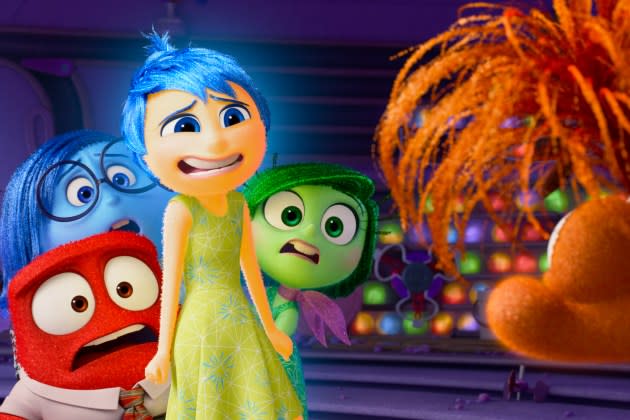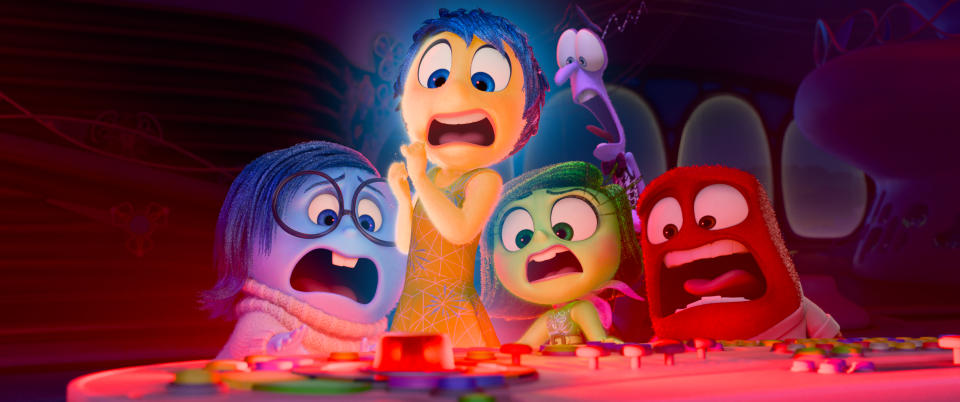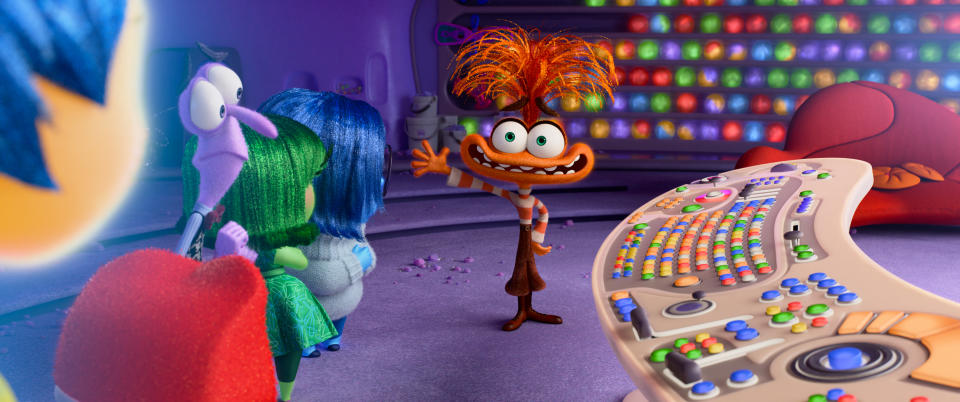‘Inside Out 2’ Craftspeople On Reworking Riley’s World For A Sequel & Bringing In New Emotions While Staying “True And Faithful To The Original Voice”

It’s been nearly a decade since the original film came out, so the animation required some updates before Inside Out 2 would be ready to go. For this, Pixar had a team of both new and returning craftspeople working tirelessly to rework the world and introduce a new set of emotions to tell a new story for the sequel.
Inside Out 2 returns to follow Riley Anderson (Kensington Tallman) and her emotional network during her teenage years. As she hits puberty, a crew of new emotions shows up, upsetting the balance Joy (Amy Poehler) has created in Riley’s mind. As the craftspeople were in charge of updating the world of Inside Out, they also had to deal with the introduction of new emotions, including Anxiety (Maya Hawke). Inside Out 2 releases in theaters on June 14, 2024.
More from Deadline

“There’re good and bad things about working on a sequel,” says story artist Rebecca McVeigh. “The good thing is that Inside Out’s cast of original five emotions are so distinctive and it’s easy to occupy that space because they are so well realized as characters in the first film.” As someone new working on the Inside Out universe, McVeigh found the challenge to be living up to the legacy of a film that was so beloved. “You want to stay faithful and true to the original voice of those characters, but you’re also bringing something new because this is supposed to be a new story where we want to explore new ground.”
For cinematographer Adam Habib, who worked on the original film, the sequel presented a great opportunity to not just explore new ground, but revisit some of their old techniques. “That widescreen aspect ratio was a good reminder to every department that you can push things and can revisit the visual themes of the movie,” he says. “For layout, we still had a human world camera style and a mind world camera style, and we wanted to keep that motif from the first film, but for this film we used anamorphic lenses or anamorphic rendering in the human world style, and that to me was like, ‘Why didn’t we think of that the first time?’”
Alternatively, production designer Jason Deamer wasn’t able to fall back on anything from the previous film, as technology had progressed too far since then and all of the characters needed to be recreated from scratch. “We’ve recreated characters from scratch anytime we’ve made a sequel, and they get slightly more sophisticated because the software’s gotten better,” he says. “This was a slightly different situation though, because we just couldn’t use anything. We basically started from scratch and had to try to do it again. The first job was to make it look like the original characters, so people would see Joy, and not like Joy’s cousin or something. Second, we asked if we could do better.” An example of this is with Sadness’ sweater, which was created using displacement techniques to create the pattern in the first film. “With [animation software] Houdini, we wove the sweater with actual yarn, so if you put them right next to each other, you know that’s a sweater.”

Though the work was challenging, McVeigh says that director Kelsey Mann’s clear vision for the film was a great “guiding light” in bringing forward new ideas, including the exploration of Anxiety. “I love Anxiety,” she says. “She’s sort of an artist’s dream to draw. She’s very cartoony, and kind of floppy and weird with gangly proportions. I just love everything about her.”
For animation supervisors Evan Bonifacio and Dovi Anderson, Anxiety was less of a dream at first. “The character of Anxiety was definitely another big challenge,” says Bonifacio. “The rig for one, just trying to figure out how to craft controls on that massive mouth of hers, and then her acting and character was another aspect that was very tricky.”
“With Anxiety, we came up with this great brainstorm of, ‘Maybe she’s nervous and jittery and she’s like a thousand miles a minute,’” says Anderson. “Then we realized this is a character we do want the audience to identify and empathize with, and not become exhausted watching. So, part of the challenge was to not just throw only those kinds of things in how she’s moving, but give her a range of movement, so the audience will want to see her point of view and not be like, ‘No more Anxiety, please.’”
That challenge was really met by editor Maurissa Horwitz, who needed to find a new rhythm for the edit whenever a new emotion was in charge. “I definitely felt like we needed to change the rhythm a bit and feel differently when Anxiety is up there,” she says. “She was really hard to figure out, because if you made her too anxious right off the bat, or the cutting too fast, it was going to be hard to live in that zone for the full movie, so we had to ramp her up through the course of the movie. So, she definitely has her own energy that leads to different cutting or just the pace of her dialogue, and Maya [Hawke] is a naturally fast talker so it was very easy to make the pace of the dialogue match her energy.”
The edit also needed to change whenever another new emotion showed up, as Horwitz emphasized the importance of rhythm in her work. “Embarrassment being a bigger character, he makes quick decisions, and then there’s a lot of hiding and falling, but that is a different tempo than Anxiety,” she says. “And then you’ve got Envy who can be very moony, very starry-eyed about things, so you want to linger on things with her. So, it was really fun to find the balance of each new emotion.”
Best of Deadline
Hollywood & Media Deaths In 2024: Photo Gallery & Obituaries
2024 Premiere Dates For New & Returning Series On Broadcast, Cable & Streaming
‘Bridgerton’ Season 3 Part 1 Recap: What to Remember for Part 2
Sign up for Deadline's Newsletter. For the latest news, follow us on Facebook, Twitter, and Instagram.


